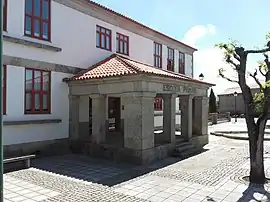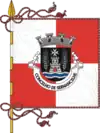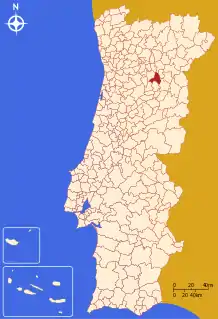Sernancelhe
Sernancelhe (Portuguese pronunciation: [sɨɾnɐ̃ˈsɐʎɨ] ⓘ) is a municipality in the district Viseu, Portugal. The population in 2011 was 5671,[1] in an area of 228.61 km2.[2]
Sernancelhe | |
|---|---|
 | |
 Flag  Coat of arms | |
 | |
| Coordinates: 40°53′N 7°29′W | |
| Country | |
| Region | Norte |
| Intermunic. comm. | Douro |
| District | Viseu |
| Parishes | 13 |
| Government | |
| • President | Carlos Silva (PSD) |
| Area | |
| • Total | 228.61 km2 (88.27 sq mi) |
| Population (2011) | |
| • Total | 5,671 |
| • Density | 25/km2 (64/sq mi) |
| Time zone | UTC±00:00 (WET) |
| • Summer (DST) | UTC+01:00 (WEST) |
| Website | http://www.cm-sernancelhe.pt |
The present mayor is Carlos Silva Santiago, elected by the Social Democratic Party. The municipal holiday is May 3.
Parishes
The municipality is composed of 13 parishes:[3]
- Arnas
- Carregal
- Chosendo
- Cunha
- Faia
- Ferreirim e Macieira
- Fonte Arcada e Escurquela
- Granjal
- Lamosa
- Penso e Freixinho
- Quintela
- Sernancelhe e Sarzeda
- Vila da Ponte
Notable people
- João Rodrigues Tçuzu (1561/2 – 1633/4) soldier, interpreter and priest; known for his early linguistic works on Japanese; introducing western science and culture to Korea
- Francisco de Soveral (ca.1565 – 1642) a Portuguese prelate; 9th Bishop of São Tomè and the 5th Bishop of Angola and Congo, 1627 to 1642.
- Aquilino Ribeiro (1885–1963) a writer and diplomat; nominated for the Nobel Prize for Literature in 1960 for his novels
References
- Instituto Nacional de Estatística
- Eurostat
- Diário da República. "Law nr. 11-A/2013, page 552 113" (pdf) (in Portuguese). Retrieved 9 July 2014.
External links
Wikivoyage has a travel guide for Sernancelhe.
This article is issued from Wikipedia. The text is licensed under Creative Commons - Attribution - Sharealike. Additional terms may apply for the media files.